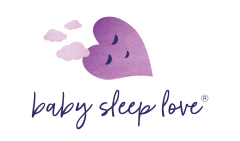
Baby Sleep Love
Certified Sleep Consultant

Pacifiers and Baby Sleep: the “Do”s and “Don’t”s
Pacifiers can be a lifesaver for many parents, providing a quick and effective way to soothe their babies. However, when it comes to sleep, the use of pacifiers can have both positive and negative effects. Understanding these can help you make informed decisions about incorporating pacifiers into your baby’s sleep routine.
The Pros of Pacifiers for Baby Sleep
Soothing and Comfort
Pacifiers provide a natural way for babies to self-soothe, which can help them fall asleep more quickly and stay asleep longer. The sucking action releases endorphins, promoting relaxation and comfort.
Reduced Risk of SIDS
Research shows that pacifier use during sleep is associated with a reduced risk of sudden infant death syndrome (SIDS). The American Academy of Pediatrics (AAP) recommends offering a pacifier at nap time and bedtime to lower this risk. However, it’s important to understand that this serves as a protective factor only (i.e., NOT offering a pacifier does not mean that you increase your baby’s risk of SIDS).
Easier to Wean than Thumb-Sucking
Unlike thumb-sucking, pacifiers can be gradually taken away, making it easier to wean your baby off the habit when the time comes.
The Cons of Pacifiers for Baby Sleep
Dependency
One of the biggest downsides of using pacifiers for sleep is the risk of dependency. Babies can become reliant on the pacifier to fall asleep, leading to frequent night wakings if they lose it and can’t find it on their own.
Potential for Dental Issues
Extended pacifier use can lead to dental problems, such as misalignment of the teeth or changes in the shape of the mouth. It’s important to limit pacifier use as your child grows older to mitigate these risks.
Ear Infections
Some studies have linked pacifier use with an increased risk of middle ear infections. While this risk is relatively small, it’s something to consider when deciding whether to use a pacifier for sleep.
Balancing the Pros and Cons
To make the most of pacifiers while minimizing the downsides, consider the following evidence-based recommendations:
Limit Use to Sleep Times
Restrict pacifier use to nap times and bedtime to prevent dependency and reduce the risk of dental issues. This also helps to signal to your baby that the pacifier is specifically for sleep.
Encourage Self-Soothing
Teach your baby to self-soothe without the pacifier by gradually reducing its use. For example, you can start by offering the pacifier at the beginning of sleep but gently removing it once your baby is asleep. Ultimately, your baby does not need a pacifier to sleep well and independently (even if they currently use you to pacify!), and it’s likely they’ll sleep better overall without it.
Monitor Dental Health
Pay attention to your child’s dental development. If you notice any changes in their teeth alignment or mouth shape, consult with a dentist for advice on weaning off the pacifier.
Use Orthodontic Pacifiers
Opt for orthodontic pacifiers, which are designed to support natural oral development and reduce the risk of dental problems.
Conclusion
Pacifiers can be a valuable tool for helping your baby sleep better, but it’s essential to balance their use with other soothing techniques to prevent dependency and dental issues. By following these guidelines, you can help your baby enjoy the benefits of pacifiers while minimizing potential downsides. Remember, every child is unique, so it’s important to find what works best for your baby and your family.
Pacifiers and baby sleep Pros and cons of pacifiers Baby sleep solutions SIDS prevention Baby soothing techniques Pacifier dependency Dental health and pacifiers Sleep training tips Baby sleep aids Pacifier weaning Self-soothing in babies Orthodontic pacifiers Sleep routine for babies Newborn sleep tips Infant sleep habits Baby sleep patterns Safe sleep practices Pacifier use guidelines Night wakings in babies Baby comfort objects Reducing pacifier use Pacifier and ear infections Baby bedtime routine Pacifier alternatives Sleep consultant advice
Have a baby around 4 months old that is suddenly not sleeping as well as they used to? It could be the 4-month sleep regression, which often hits parents hard.
Got a sleep situation that can’t be solved by the Baby Sleep Basics? Maybe it’s time to consider signing up for one of my Certified Sleep Consultant packages.
Follow Baby Sleep Love on Facebook and Instagram to get regular, free sleep advice.